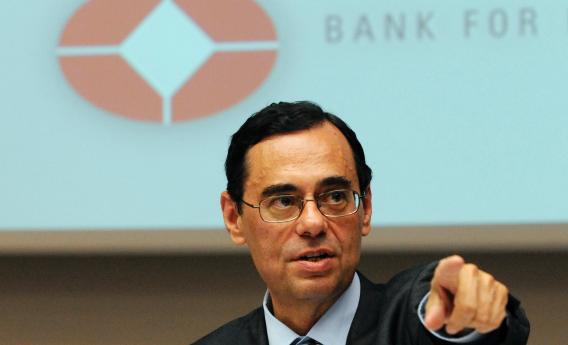Most of us could be healthier if we ate more vegetables and exercised more. So given that people would generally like to be healthier, you might decide that the availability of vegetables leads people to curtail their exercising. Perhaps if we banned frozen vegetables from supermarkets to make obtaining good vegetables less convenient, people would compensate by working out more. Certainly increasing the availability of vegetables would be foolhardy given that most people are clearly exercising a suboptimal amount. Rather than bailing people out with healthy food, governments should be exhorting people to adopt more active lifestyles.
Does that make sense to you?
Well it doesn’t make sense to me, but it might make sense to the Bank for International Settlements, which over the weekend urged the world’s Central Banks to stop trying to provide appropriate monetary policy and instead raise interest rates in hope of encouraging governments to improve public policy in other areas. Paul Krugman takes issue with their specific prescription of deficit reduction, but I think the really crucial thing here isn’t the nonmonetary measures they prescribe but the linkage they perceive between monetary policy and other areas of policy. In their view, countries around the world have a lot of public policy problems that aren’t monetary in nature (I agree). They then seem to think that there’s like a fixed quantity of “good policy” out there in the world, such that appropriate monetary policy will crowd out appropriate structural reforms, whereas inappropriate monetary policy will induce them. There’s no empirical basis for this view that I’m aware of, and some substantial reason to think the opposite is the case.
But most of all, I think this line of thinking completely subverts the role of the modern Central Bank and its relationship to other policymaking institutions. The idea of the “independent” Central Bank is that the legislature should give a directive (“stabilize demand”) to a committee of technical experts who are given a free hand to implement the directive. This is a not-so-unusual feature of a modern bureaucratic state. Legislators set broad priorities and weigh different kinds of interests while bureaucrats develop detailed rules and take front-line actions. The BIS view of the Central Bank’s role—a view that seems very similar to the self-conception of the European Central Bank—is that rather than a technical body with a mission, the Central Bank should serve as a kind of super-government. Since the Central Bank is well-staffed with technical experts in economics, the role of the Central Bank is to devise a comprehensive economic policy program and then use monetary policy as a lever with which to induce the implementation of the program.
In this view, when judging the stance of monetary policy, a key question is the political response. If easier money improves the economic situation in Italy and Spain and that “reduces pressure for reform” on the elected governments, then it should be avoided. The goal isn’t to adopt the monetary policy that best suits economic conditions, it’s to adopt the monetary policy that best suits political conditions and ensures the right policies will be adopted.
Not only does this completely fly in the face of the rule of law and principles of democratic accountability, but it necessarily involves Central Bankers blundering into an area in which they, in fact, have no expertise whatsoever—electoral politics and legislative dynamics. Ben Bernanke and his staff are reasonably well-equipped to judge what kind of policies will increase employment and raise inflation expectations. They are terribly equipped to judge what kind of policies will induce the political conditions that make a grand bargain on long-term fiscal policy likely. It’s much too hard a question. Political institutions generally function best when they’re given relatively clear goals and held accountable for them. Monetary policy is “not a panacea” as people say. But it is important. Too important for monetary policymakers to ignore it in favor of pursuing other agendas. If you have high unemployment amid low and nonrising inflation, then your monetary policy is too tight. You probably have other problems, too, but if your job is to run a Central Bank then you ought to focus on the fact that your monetary policy is too tight. Let someone else worry about the rest.
